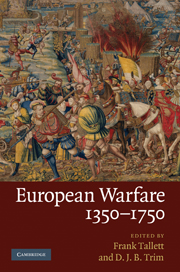Book contents
- Frontmatter
- Contents
- List of figures
- List of maps
- List of tables
- Notes on contributors
- Acknowledgements
- Note on the text
- List of abbreviations
- Maps
- 1 ‘Then was then and now is now’: an overview of change and continuity in late-medieval and early-modern warfare
- 2 Warfare and the international state system
- 3 War and the emergence of the state: western Europe, 1350–1600
- 4 From military enterprise to standing armies: war, state, and society in western Europe, 1600–1700
- 5 The state and military affairs in east-central Europe, 1380–c. 1520s
- 6 Empires and warfare in east-central Europe, 1550–1750: the Ottoman–Habsburg rivalry and military transformation
- 7 Ottoman military organisation in south-eastern Europe, c. 1420–1720
- 8 The transformation of army organisation in early-modern western Europe, c. 1500–1789
- 9 Aspects of operational art: communications, cannon, and small war
- 10 Tactics and the face of battle
- 11 Naval warfare in Europe, c. 1330–c. 1680
- 12 Legality and legitimacy in war and its conduct, 1350–1650
- 13 Conflict, religion, and ideology
- 14 Warfare, entrepreneurship, and the fiscal-military state
- 15 War and state-building
- Bibliography
- Index
13 - Conflict, religion, and ideology
Published online by Cambridge University Press: 05 June 2012
- Frontmatter
- Contents
- List of figures
- List of maps
- List of tables
- Notes on contributors
- Acknowledgements
- Note on the text
- List of abbreviations
- Maps
- 1 ‘Then was then and now is now’: an overview of change and continuity in late-medieval and early-modern warfare
- 2 Warfare and the international state system
- 3 War and the emergence of the state: western Europe, 1350–1600
- 4 From military enterprise to standing armies: war, state, and society in western Europe, 1600–1700
- 5 The state and military affairs in east-central Europe, 1380–c. 1520s
- 6 Empires and warfare in east-central Europe, 1550–1750: the Ottoman–Habsburg rivalry and military transformation
- 7 Ottoman military organisation in south-eastern Europe, c. 1420–1720
- 8 The transformation of army organisation in early-modern western Europe, c. 1500–1789
- 9 Aspects of operational art: communications, cannon, and small war
- 10 Tactics and the face of battle
- 11 Naval warfare in Europe, c. 1330–c. 1680
- 12 Legality and legitimacy in war and its conduct, 1350–1650
- 13 Conflict, religion, and ideology
- 14 Warfare, entrepreneurship, and the fiscal-military state
- 15 War and state-building
- Bibliography
- Index
Summary
This chapter examines how religion influenced the ways in which polities and commanders conducted war and how the influence of religion changed over the period 1350–1750. This epoch witnessed both the greatest penetration by Islamic powers into Europe, and the Protestant Reformation. However, it must not be assumed either that religion was an unimportant factor in warfare before the Ottoman expansion into central Europe of the mid-to-late fifteenth century or the conflicts between Catholic and Protestant of the mid sixteenth to mid seventeenth centuries, or that it ceased to be influential after the Peace of Westphalia (1648), traditionally regarded as the terminal date of ‘wars of religion’. In fact, religion was far from being unimportant at any point up to the mid eighteenth century – but its influence on conflict changed over the period.
Up to the mid seventeenth century, religion influenced the conduct of military operations, being one of several factors that led generals actively to avoid battles; but from the late seventeenth century on, this was no longer the case. Up to the 1520s, then, religion was important primarily as an influence on how warfare was conducted, rather than as a cause of warfare. It generated wars only on Europe's north-eastern, south-eastern, and south-western margins, and was a factor in mobilising men and resources from across Christendom for those wars.
- Type
- Chapter
- Information
- European Warfare, 1350–1750 , pp. 278 - 299Publisher: Cambridge University PressPrint publication year: 2010
- 1
- Cited by

